Minimum Order Quantity (MOQ) is a critical metric that helps suppliers manage production costs and inventory, while businesses use it to strategize wholesale purchases and maintain efficient supply chains.

MOQ is the acronym for Minimum Order Quantity. So what does MOQ mean in manufacturing? Understandably, if you place an order, the manufacturer will require a minimum order quantity to ensure profit and avoid costs due to low order value. This article will provide basic knowledge and the meaning of MOQ for your reference.
What is MOQ?
The minimum order quantity, or MOQ, is an important production indicator that helps suppliers determine whether the order is profitable. The information below will help you generalize information about MOQ.
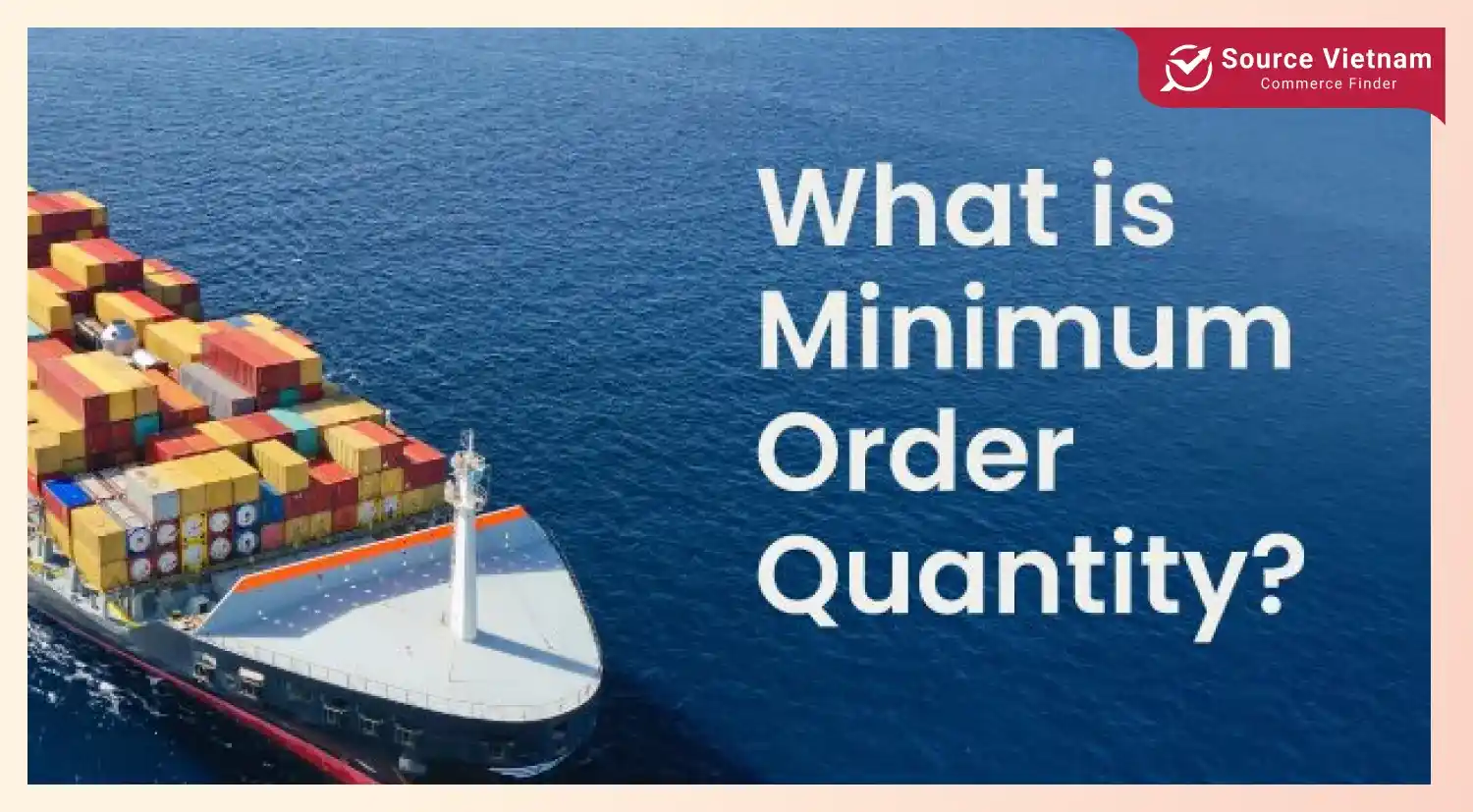
- Definition: The minimum order quantity is the smallest (per unit) that a supplier is willing to produce or sell simultaneously. If you are unsure you can buy within the MOQ, the supplier may reject the order.
- Purpose: Suppliers set MOQs to optimize production efficiency by using time or combining production batches to optimize costs. At the same time, MOQ in manufacturing helps businesses and suppliers prepare warehouses, manage inventory better, and reduce the number of small-value and low-profit orders.
Every manufacturing industry requires a certain number of each unit. So what does MOQ mean in manufacturing? The answer depends on each industry which will require a different MOQ. For example, clothing manufacturing requires a minimum order of 1000kg of raw materials for each order. Paper manufacturing requires a minimum order of 10 tons of wood, etc.
Read more >>> Top 11 Best B2B Wholesale Platforms for Businesses in 2025
MOQ in business: A general analysis
MOQ in business plays an important role for enterprises in formulating strategies for different business models such as wholesale, supply chain, and negotiation. The following points explain in deeper meaning the question: what does MOQ stand for in business.
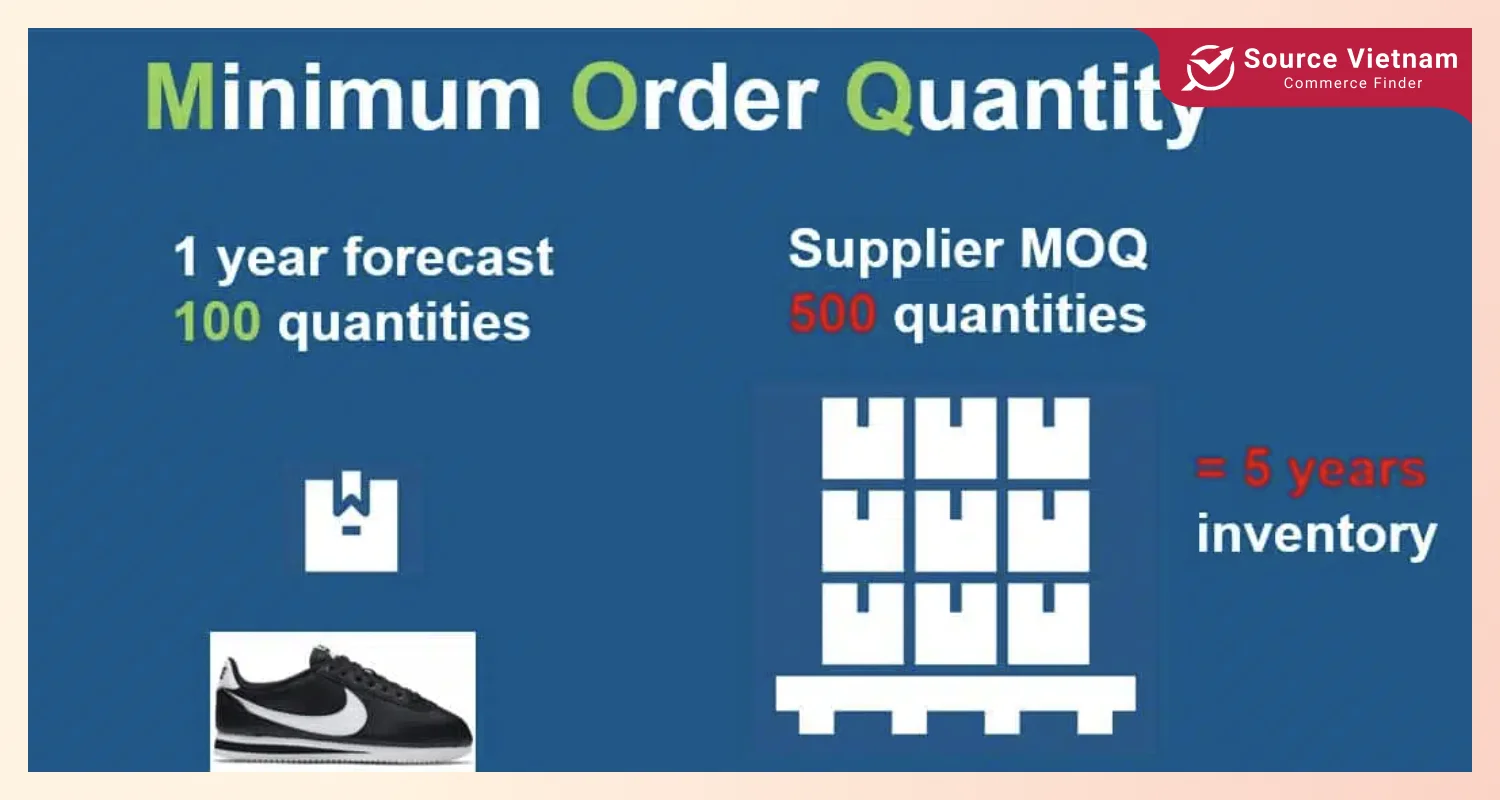
- Wholesale: MOQ in wholesale is crucial in deciding the minimum order quantity to receive bulk discounts when buying in large quantities. This is a factor that helps businesses ensure profits or get rich thanks to such orders. The larger the MOQ, the more the business has the right to increase the discount level, saving production costs. Thanks to this MOQ wholesale meaning, enterprises have their plan to strategize the business overview picture.
- Supply chain: MOQ in supply chain promotes the overall operations of the supply chain. MOQ helps balance inventory levels and provides standard data to optimize the production process, thereby helping businesses significantly reduce costs for production activities and MOQ supply chain management.
- Negotiation: MOQ is completely negotiable, depending on the supplier and specific circumstances such as the expected total fixed production volume per year, the entrepreneur’s prestige, payment terms or potential for long-term cooperation, and current market conditions.
Read more >>> What is contract manufacturing? Pros and Cons for Businesses
Why do suppliers use the minimum order quantities factor?
Suppliers also need to have an effective strategy for using minimum order quantities. Let’s discuss those reasons below.

- Cost efficiency and economies of scale: MOQ in manufacturing, especially from the supplier’s perspective, should be considered as a way to achieve cost efficiency by reducing production costs. For larger orders, it means lower unit costs due to economics of scale. MOQ helps suppliers spread costs evenly across each unit, reducing setup costs. Maximizing their and the buyer’s profits while getting rid of waste repeatedly produced.
- Inventory management and turnover: MOQs allow suppliers to maintain good inventory turnover rates, avoid overstocking, and economical inventory management. Suppliers can match their stock levels with demand by setting proper minimum order quantities, which promotes efficient inventory turnover and management.
- Risk mitigation and financial stability: MOQ helps suppliers minimize major risk mitigation by adjusting production capacity and pace for each buyer, at each certain time of the year. There are no popups or production variables large enough to affect. Because of stable volume production, suppliers also ensure revenue and have sustainable financial stability.
The ways that MOQ impacts inventory management
MOQ and inventory always go hand in hand and MOQ is the deciding factor in inventory. The following reasons are considered as the condition that illustrates how MOQ directly impacts inventory management.
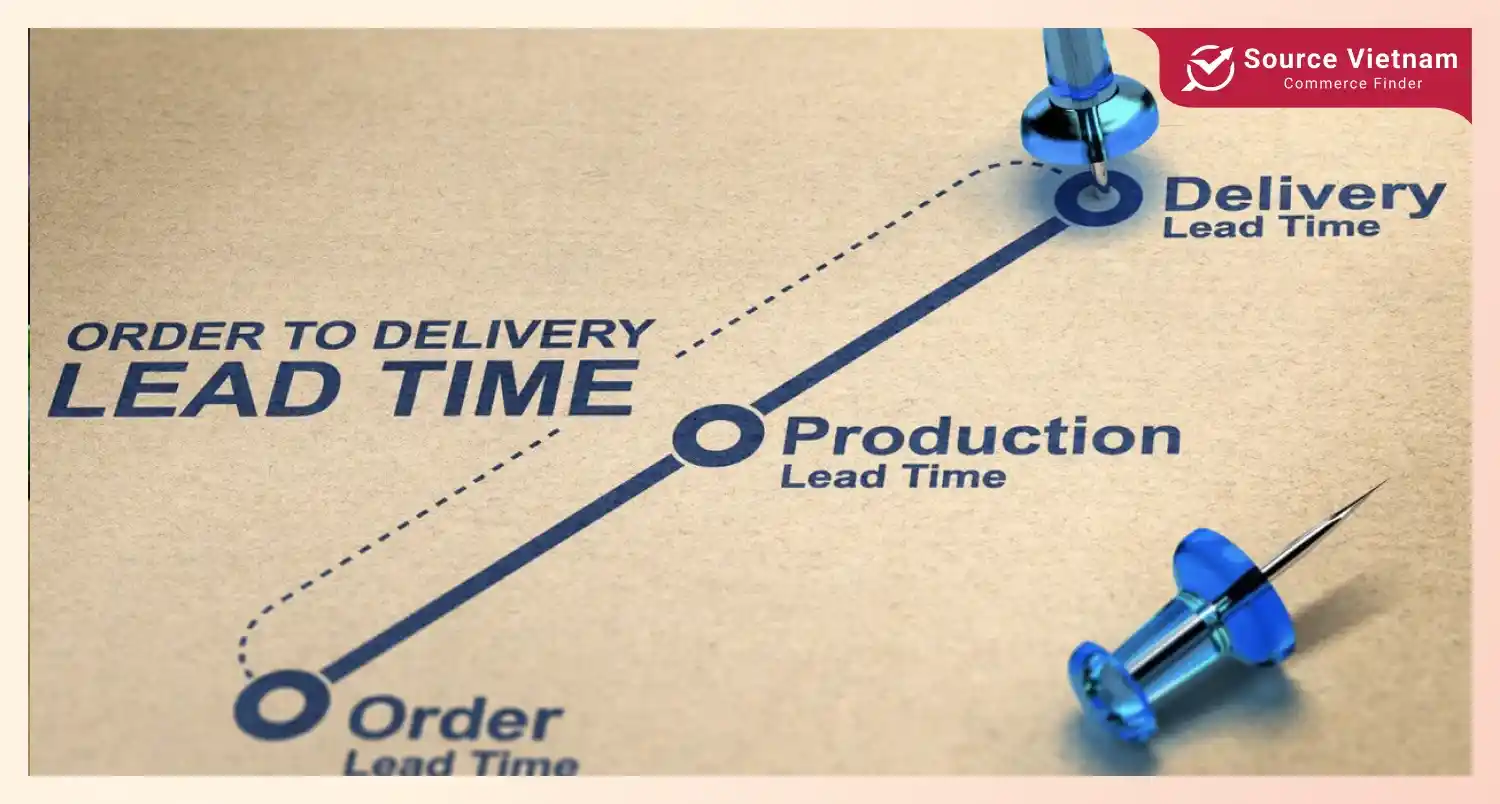
- Effects on stock levels and storage requirements: MOQ determines the inventory level of both suppliers and businesses. Businesses must provide an accurate MOQ to ensure that the inventory that has just been shipped out is replaced by another batch of goods or that inventory piles up in the warehouse. These cases will increase operating costs such as storage costs and increased storage requirements.
- Influence on order fulfillment and lead times: For businesses with limited inventory or variable production needs, order fulfillment is considered closely. Businesses must balance MOQ and lead times, avoiding over or under-allocation of incoming shipments.
- Strategies to balance MOQ with demand forecasting: To avoid out-of-stock or excess inventory, the enterprise needs a department to provide strategic MOQ demand forecasts. This department is responsible for predicting the exact business capability needs at each point. Ensure that actual inventory levels are not too different from demand forecasts.
Comparison between high vs. low minimum order quantities
What does MOQ mean in manufacturing? High MOQs or low MOQs are more beneficial to enterprises. Consider the advantages and disadvantages of these two MOQ levels to determine your business strategy.
Advantages and disadvantages of high MOQs
| Advantages of high MOQs | Disadvantages of high MOQs |
| Lower cost (per unit) | Upfront investment cost |
| Production efficiency | Inventory holding costs |
| Stronger supplier relationships | Deadstock (in a specific case) |
- Advantages: Of course, when you place a larger minimum order quantity, the costs are spread out, and the unit cost is lower. Your larger orders mean that you are the preferred partner of the supplier, and over time this makes stronger supplier relationships. You will have more negotiating power, which makes production more efficient.
- Disadvantages: High MOQs will also cost a lot of initial investment, and increased capacity and storage costs. Additionally, companies will have to pay more to manage this inventory or find a means to sell it before the new production runs if the market suddenly changes significantly

Discuss the benefits and challenges of low MOQs
| Benefits of low MOQs | Challenges of low MOQs |
| Reduced financial risk | High costs (per unit) |
| Flexibility | Less favorable terms (with suppliers) |
| Test new products or markets easily | More frequent ordering |
- Benefits: By using low MOQs, businesses have more opportunities to experiment with products and try to expand into new markets. Low MOQs reduce financial risks if these experiments fail and provide more flexibility to rotate products too.
- Challenges: When you order from a supplier at low MOQs, unit costs will surge. Suppliers may apply terms that are unfavorable to you or require you to order more frequently. If in the long run, you still choose low MOQs, then you will not optimize costs and may even lose.
Case studies or examples: For large enterprises with fixed loyal customers, high MOQs should be chosen to reduce unit costs. New enterprises entering the market and not aiming at product segmentation can choose low MOQs for investigation in the first stage.

How to calculate and negotiate MOQ?
Calculating or negotiating a standard MOQ is not easy. Businesses need to notice some factors that affect it or how to support standard MOQ analysis
- Factors influencing MOQ calculations: In reality, businesses want to choose a standard MOQ level but can only balance it to a certain level due to other factors. One of them is the business’s ability to ensure production costs, seasonal material availability, or demand forecasts that are skewed due to objective factors, storage capacity at a certain period.
- Tips for negotiating favorable MOQ terms: To obtain a competitive edge at the negotiation table, businesses must demonstrate to suppliers their willingness to work with them over the long term by committing. You should be flexible with payment contract conditions, and establishing enduring business relationships
- Tools and resources for MOQ analysis: In addition to manual calculation strategies, businesses can use inventory management software, supply chain optimization analysis tools, etc. to support quick and accurate analysis with more variables.

MOQ in wholesale and supply chain management
How does MOQ affect wholesale and supply chains? Does it help businesses reduce management costs? Review the information below.
- Role of MOQ in wholesale purchasing: MOQ in wholesale purchasing is often encouraged as it allows businesses to get discounts on bulk purchasing. This benefits both suppliers as they target large-value orders and are willing to offer volume discounts. The larger the business is, the stronger the win-win relationship with the supplier is.
- Impact on supply chain efficiency and cost management: The supply chain plays a key role in allocating the right amount of inventory to the right places for businesses. MOQ in supply chain helps them reduce costs by placing inventory flows in the right areas.
- Best practices for integrating MOQ into supply chain strategies: Supply chain strategy includes demand forecasting, supplier collaboration, customer segmentation, and inventory optimization.

Factors influencing MOQs
MOQs impact businesses in many different ways. On the other hand, these factors also impact MOQs.
- Production costs: Setup costs and raw material ones are two types of costs that affect production costs. Setup costs refer to the initial fixed costs that a business must pay for the first production run, which only decrease when the MOQ is large. The cost is spread evenly across each unit, raising production efficiency. In addition, fluctuations in raw material costs will also change the MOQ. MOQ in manufacturing will be forced to increase or decrease depending on profit margin.
- Inventory management: This is the ability that businesses need to prevent overstock. You can set the minimum level that customers must order. This helps increase inventory turnover and matches your production and storage capacity. At the same time, determine the EOQ index to consider storage costs or order costs to adjust accordingly.
- Order fulfillment: The two main factors affecting order fulfillment are processes and shipping costs. Determine production capacity to calculate production batches to optimize costs. Shipping costs depend on economies of scale, domestic or international shipping.
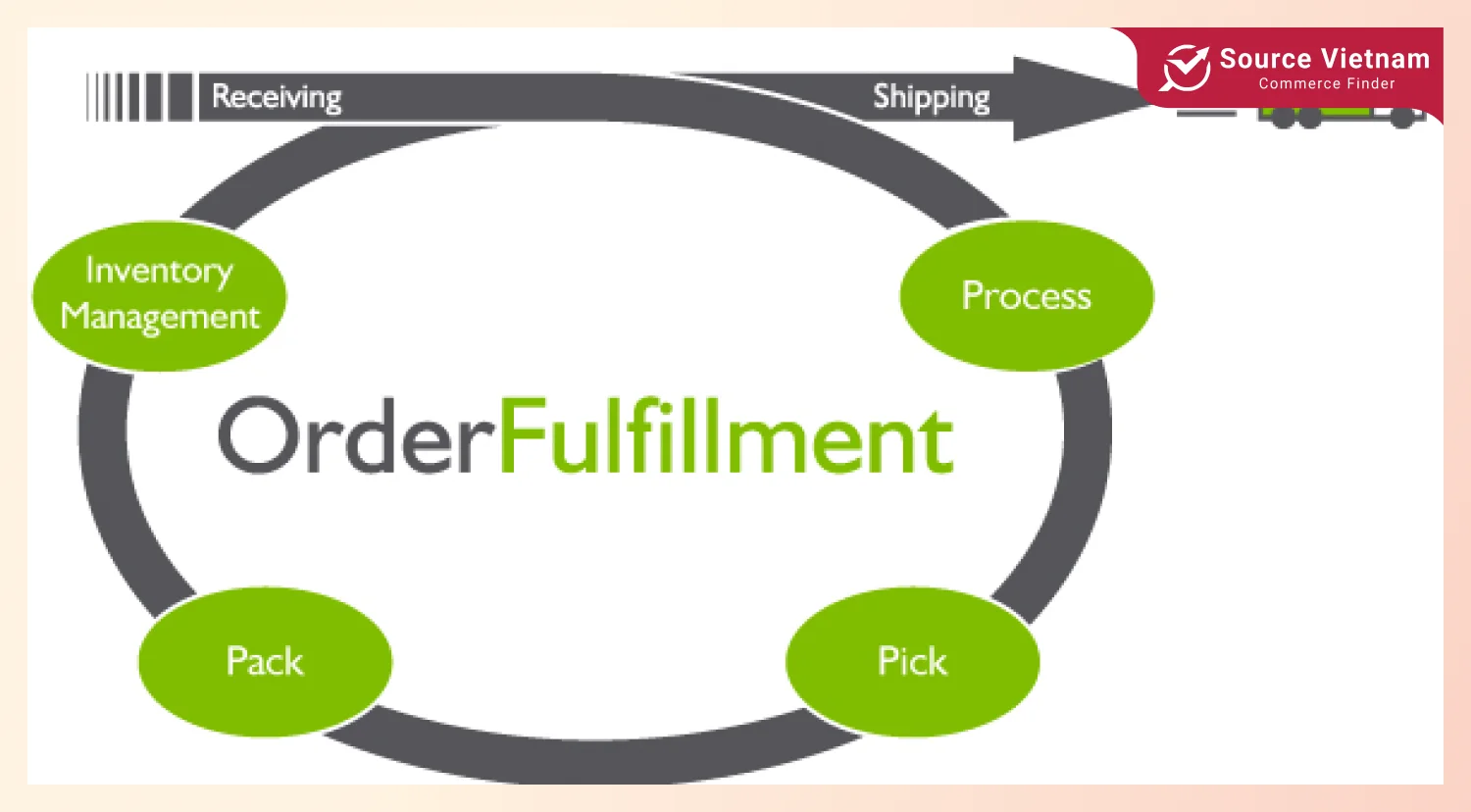
- Supplier relationships: Build supplier relationships that make it easy for businesses to negotiate prices, time, and MOQ.
Factors affecting MOQ: what you need to know
Alternative strategies to manage MOQ
The strategy to help businesses manage MOQ is to use technology systems or tools to support the following:
- Just-in-Time (JIT) inventory systems: Just-in-Time Inventory System operates on a demand-pull basis. Accordingly, production materials will be ordered and received based on the actual needs of customers at that time, as long as the order is guaranteed not to be a loss. This helps customers and suppliers reduce excess inventory levels, and storage costs, or maintain stock levels of materials. Suppliers provide materials regularly to the production line.
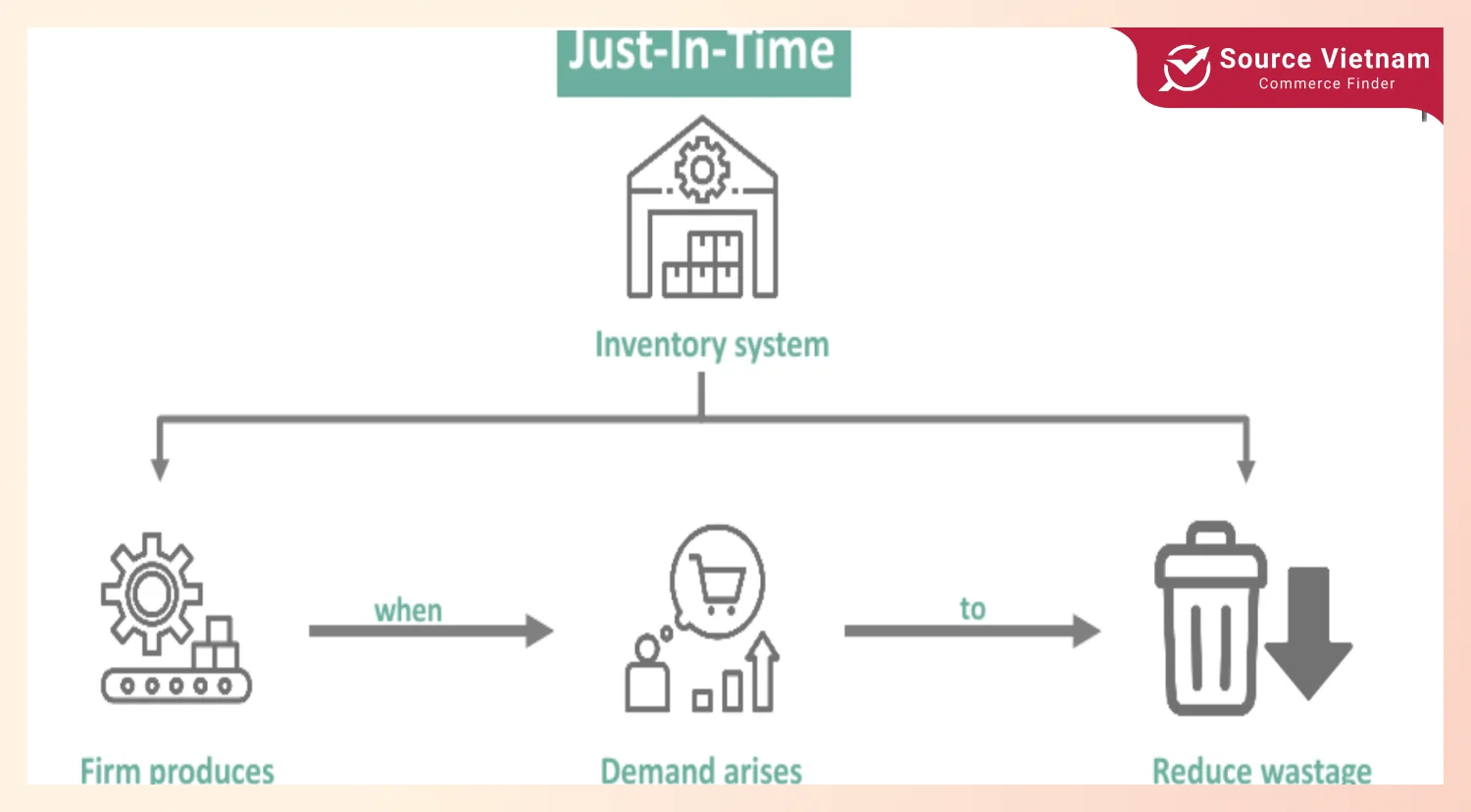
- Collaborative forecasting with suppliers: By sharing data and insights with suppliers, you will be advised on accurate demand forecasts. As a result, there is less chance of overestimating or underestimating demand since client needs are better understood.
- Utilizing technology and software solutions: There is a lot of software and tools available today that can help you accurately calculate MOQ and customize adjustments if there are any changes. These tools can predict or analyze historical data and market trends to suggest an approximate number.
Conclusion
Understanding what does MOQ mean in manufacturing is very vital in manufacturing and business. Its role is balancing inventory levels, optimizing production processes, and promoting effective supply chain management. Businesses, especially the purchasing department, need procurement strategies to optimize profits. Visit SourceVietnam.com for the detailed answer, discover more information about MOQ strategies and knowledge for your business.
FAQs
Why do suppliers have MOQs?
Suppliers have MOQs to optimize production costs, achieve economies of scale, and maintain the order fulfillment process.
Can MOQs be negotiated?
Yes, MOQs can be negotiated, depending on your supplier relationships and volume commitments or order frequency.
How can businesses negotiate lower MOQs with suppliers?
Businesses negotiate lower MOQs with suppliers by committing to a long-term manufacturing relationship with a fixed quantity and maintaining the company’s prestige through the order fulfillment process.
How can I manage MOQs effectively in my business?
Managing MOQs effectively in your business by optimizing inventory turnover, and effectively utilizing the economics of scale of MOQs, making sure of the good relationship between your company and your “favorite” supplier.
What are the risks associated with high MOQs?
The risks associated with high MOQs are higher upfront investment, increased inventory holding costs, and the potential for dead stock if demand is lower than expected.















